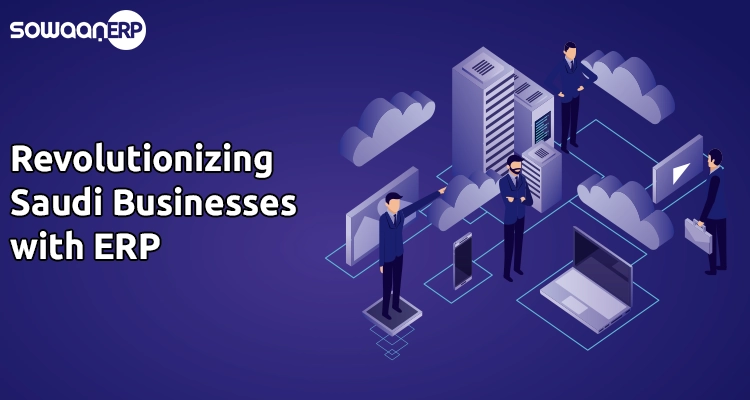
The business landscape in Saudi Arabia is rapidly changing. One of the key drivers of this change is the adoption of cloud ERP software. The benefits of cloud ERP software in Saudi Arabia are numerous and have a profound impact on how Saudi businesses operate.
What is a cloud-based ERP solution?
A cloud-based ERP (Enterprise Resource Planning) solution is a type of software that runs on the internet, rather than on your own computer or server. It helps businesses manage their resources more efficiently. This includes everything from inventory and order management to accounting and human resources.
Cloud-based ERP solutions are the future of business management. They provide a centralized platform where all business processes can be managed and monitored. This not only simplifies operations but also improves productivity and efficiency.
In Riyadh, businesses are quickly adopting these cloud-based solutions. benefits ERP software in Riyadh is becoming an essential tool for many companies. The ability to access data in real-time, irrespective of location, has made decision-making faster and more accurate. Besides, with features like automated updates and robust security, these systems are proving to be a smart investment for businesses of all sizes.
Features of a cloud-based ERP solution
A top cloud ERP software in Saudi Arabia comes packed with features. These include real-time data analysis, which allows for quicker decision-making. It also offers scalability, meaning it can grow with your business. Plus, being in the cloud means you can access it from anywhere, at any time.
Moreover, cloud ERP system in Saudi Arabia offers robust security measures. It’s designed to protect your sensitive business information from threats.
Additionally, cloud ERP software provides seamless integration with other business systems. This means that data can flow freely between departments, reducing the risk of errors and improving efficiency.
Cloud ERP software in Saudi Arabia is also user-friendly. The interfaces are intuitive and easy to navigate, even for those who are not tech-savvy. This encourages more employees to use the software, leading to better data collection and reporting. Lastly, cloud ERP providers offer excellent customer support. They provide training to your staff and are always available to answer any questions or resolve issues. This ensures that your business operations run smoothly and without interruption.
Advantages of cloud-based ERP over other ERP types
Cloud-based ERP systems offer many advantages over traditional ERP systems. For one, they require less upfront investment. You don’t need to buy and maintain expensive hardware. Secondly, updates are easier with cloud-based systems. The provider takes care of them, ensuring you always have the most up-to-date version of the software. This is not the case with on-premise systems, where updates can be complex and time-consuming. Plus, cloud-based ERP systems are flexible. They can be customized to fit the specific needs of your business. This is particularly useful for businesses in Riyadh, where the market dynamics are unique and constantly evolving.
Furthermore, cloud-based ERP systems provide better accessibility. With these systems, employees can access the necessary data and tools from anywhere, at any time. This is a major advantage for remote teams or businesses with multiple locations. Also, cloud-based ERPs are known for their high-speed performance. They can handle large volumes of data without slowing down, ensuring your business operations run smoothly.
Moreover, the scalability of cloud-based ERPs allows businesses to quickly adapt to changes in demand. Whether you’re expanding or downsizing, you can adjust your usage without significant delays or costs. Lastly, cloud-based ERPs are constantly updated with new features and improvements. This ensures that your business always has access to the latest technology and best practices.
Limitations of cloud-based ERP systems
Despite the many benefits, cloud-based ERP systems do have some limitations. For example, they require a reliable internet connection. If your connectivity is poor, it can disrupt your operations. Additionally, while cloud ERP providers take security very seriously, no system is entirely immune to breaches. Therefore, it’s crucial to choose a provider with robust security measures in place.
Another potential downside is the possibility of less customization compared to on-premise solutions. While cloud-based ERPs are highly flexible, there may be limitations when it comes to tailoring the software to your specific business needs.
Data ownership can also be a concern. In a cloud-based ERP, you store data on the provider’s servers. This can raise questions about who owns the data and what happens to it if you decide to switch providers or if the provider goes out of business. Furthermore, while cloud-based ERPs often have lower upfront costs, the ongoing subscription fees can add up over time. It’s important to thoroughly understand the cost structure and ensure it fits within your budget.
Lastly, transitioning to a cloud-based ERP from a traditional system can be challenging. It requires careful planning and training to ensure a smooth transition and minimal disruption to your business operations.
Conclusion
Indeed, the adoption of cloud-based ERP systems is more than just a trend. It’s a strategic move that can give businesses a competitive edge. The real-time data analysis, scalability, and accessibility offered by these systems enable companies to make quicker, more informed decisions, adapt to changes faster, and provide better services to their customers. However, it’s crucial for businesses to consider their specific needs and circumstances when choosing an ERP system. You should take into account factors such as internet connectivity, security requirements, customization needs, and budget.
Furthermore, successful implementation of a cloud-based ERP system requires careful planning and training. Businesses must ensure their employees are well-prepared to use the new system and that they have the necessary support during the transition period. Despite the potential challenges, the rewards of adopting a cloud-based ERP system can be significant. As technology continues to advance, businesses in Saudi Arabia and around the world will increasingly turn to these systems to drive growth and success.


